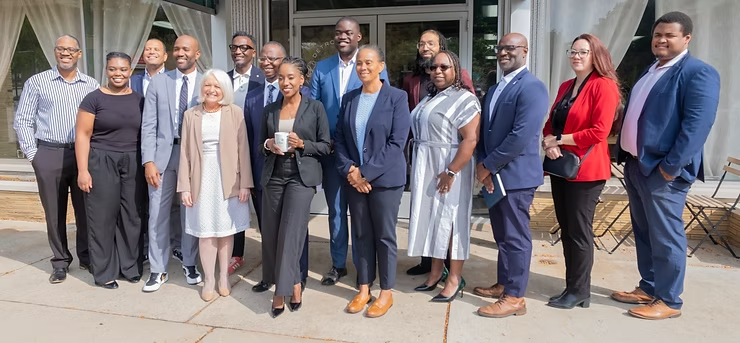How Ahya Simone tells Detroit’s story — and her own — through string
"I appreciate when people don't sensationalize my identity. I prefer it when people focus on my art. I do a lot of things for the trans community within my community, but I prefer that my identity only be referenced when it's necessary."

Ahya Simone was not supposed to be a harpist. The harp was placed on her schedule one semester at Cass Technical High School, and initially, she was hesitant to take the elective class as singing was her passion. But at the insistence of her school counselor, she took the class. And the rest is history.
Simone fell in love with the harp and its angelic sound, and it has shaped her artistic identity. To date, Simone is the only Black transgender harpist in the world and among one of the few, young professional harpists calling Detroit home.
“I didn’t have any real intentions of being a harpist, but it was a possibility for me, and it was kind of placed at my feet. It was just a really good outlet for me when I was younger, and I loved the sound it made. This is my forever instrument for sure,” says Simone via Zoom, chilling on her couch one morning at her Boston Edison home sipping tea.
Simone is a multifaceted creative. As a film composer, trans community activist, musician, screenwriter, and filmmaker, she has used the harp to transform and redefine the classical artistic pathway that has long been the norm for many harpists. She was determined not to go down the classical track where harpists have to compete for one seat in the orchestra, and many end up staying there until retirement.
“I wasn’t really happy in the environment I was in,” she says. “It just didn’t feel conducive or fulfilling for me because you’re competing with hundreds of other harpists from around the world for these spots. Most of these people die in these damn seats.”
Being creative has always come natural to Simone. As an active Union Grace Missionary Baptist Church member, she sang in the choir, performed in church plays, and danced on the step team, among other activities. The church is also where she developed her love for community engagement.
She attended Wayne State University, where she was the principal harpist for the school’s Wind Symphony. After graduating with a degree in classical harp and voice in 2014, she searched for different ways to make a living as a harpist.
Learning more about jazz harp, and the rich history of black harpists like Harvi Griffin, Alice Coltrane and fellow Cass Tech alumna Dorothy Ashby — the latter two both Detroit-born musicians who revolutionized the instrument in jazz — Simone realized she could play the harp outside its traditional confines.
Yet, very few jazz harpists were teaching musicians how to improvise, so she sought the guidance of established musicians like Grammy-nominated harpist Brandee Younger and acclaimed harpist Riza Printup.
Younger introduced Simone to jazz theory and improvisation and once she understood those disciplines, she started making her own music and working on performance art with DJs, filmmakers, and writers. Sonically, Simone’s sound is a whirlwind that draws on R&B, jazz, ambient music, and techno.
It wasn’t until Simone met Juliana Huxtable, another multidisciplinary and transgender artist, that she realized she could really pursue the harp within a non-classical context professionally. Huxtable, a writer, artist, and DJ, explores many subjects in her work including the internet, body art, history, and sex. Her work has been showcased worldwide and she also co-founded the New York-based collective Shock Value, composed of women artists, DJs, writers, and fashion icons.
“She (Huxtable) opened my eyes and showed me that I don’t have to do the orchestra thing. I don’t have to just play at Cliff Bells’ or Bakers to be considered a professional. There is a whole avant-garde world where you can do experimental things and make a living.”
With Huxtable, Simone has performed in places such as Scotland, the Netherlands, Portugal, and Vancouver, making music for Huxtable’s performance art exhibitions.
Simone’s other big-time endeavors include collaborating with filmmaker dream hampton to score her 2018 film “Treasure: From Tragedy to Trans Justice, Mapping a Detroit Story,” and developing her own film series, Femme Queen Chronicles.
In addition to her artistic venture, Simone is a trans-community organizer and co-founded the Trans Sistas of Color Project. This nonprofit organization provides resources and support for trans women of color from Detroit. At one meeting, Simone pitched creating a show based on their experiences. With funding from the Detroit Narrative Agency 2.0, which supports first-time filmmakers from the city, Simone developed a web-based comic series that centers on the lives of four trans women.
While traveling, she realized the bad reputation Detroit often has, and she saw this series as an opportunity to push back on the dominant narratives.
“I always felt like we don’t talk enough about the city, so when stories about Detroit are told, they’re always taught from a voyeuristic lens. They’re told by people who aren’t from here, and they have their own angle. I always resented that, so when I had the opportunity to tell a story about Detroit, I wanted to tell a different kind of Detroit story, knowing there’s a rich LGBT history and culture here.”
The series’ success allowed Simone to quit her day job in 2018 and work full-time developing the project, which took off and went viral on TikTok and Instagram and was also presented at several festivals. Simone pitched the series to some major networks, but now the series is on hiatus while she pursues other projects.
In 2018, Simone was awarded the Kresge Fellowship, after which more work poured in.
Currently, Simone is a part of the recently released album Transa, a 46-track concept album from the nonprofit Red Hot, with original music from over 80 artists including music vets Sam Smith, Sade, and Andre 3000. She is also finishing her debut album Neptunian Blue, and the first single will be released this month.
Although Simone has an international presence, Detroit will always be her home. She volunteers monthly at her high school alma mater, helping tune the harps with her instructors Patricia Terry-Ross and Lydia Cleaver. Notably, Cass Tech is one of the only high schools in the country that teaches the harp to students free of charge.
While Simone will always champion transgender issues and equality, she doesn’t want that to define or hinder her artistic value and accomplishments. She is adamant about the path she’s shaped as a multidisciplinary artist.
“I appreciate when people don’t sensationalize my identity. I prefer it when people focus on my art. I do a lot of things for the trans community within my community, but I prefer that my identity only be referenced when it’s necessary.”





